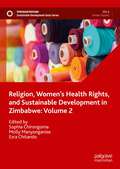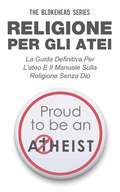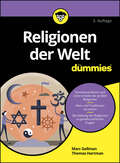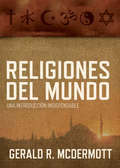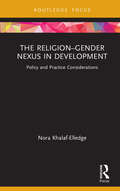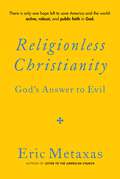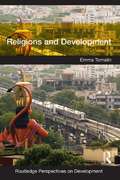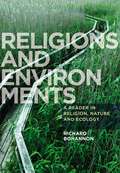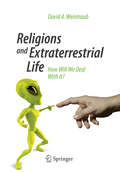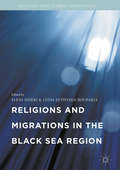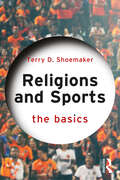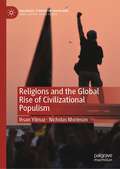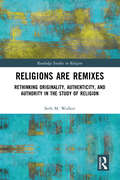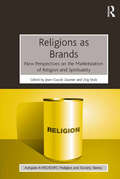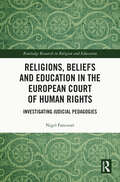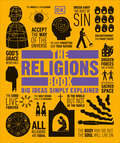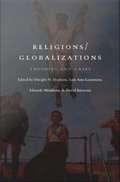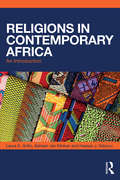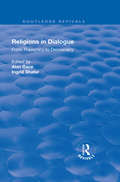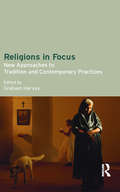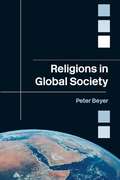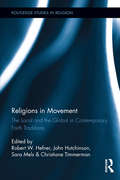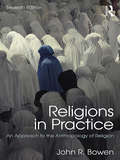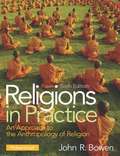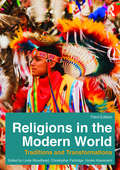- Table View
- List View
Religion, Women’s Health Rights, and Sustainable Development in Zimbabwe: Volume 2 (Sustainable Development Goals Series)
by Ezra Chitando Sophia Chirongoma Molly ManyonganiseThis volume brings to the fore the interface of religion, women’s sexual reproductive health and rights (SRHR), and the sustainable development goals (SDGs) in Zimbabwe. It emphasizes that empowering African women is a pivotal pillar for attaining sustainable development. Contributors discuss the need for implementing structural changes as a prerequisite for social progress and development to occur in Southern Africa. They interrogate the extent to which religious beliefs and practices either promote or impede women’s SRHR. The contributors also proffer several ways in which addressing the themes of health for all and equality for all women and girls can make a meaningful contribution towards the fulfillment of the goals set for Agenda 2030.
Religione per gli atei - La guida definitiva per l'ateo e il manuale sulla religione senza Dio
by The BlokeheadLa caratteristica fondamentale dell’ateismo è il rifiuto o la mancanza di fede nell’esistenza di un Essere supremo, solitamente denominato Dio e le persone che praticano tale credo sono pertanto definite atei. Tuttavia, occorre fare una distinzione, in quanto una forma di ateismo è un semplice caso di scetticismo, cioè un’impossibilità a credere nell’esistenza di Dio. In parole povere, si tratta del rifiuto o dell’incapacità di accettare il concetto che Dio sia attualmente vivo e che esista un Dio, come molta gente crede. Questo tipo di ateismo è il cosiddetto “ateismo debole”. Al contrario, l’”ateismo forte” è caratterizzato da una convinzione chiara e netta della non esistenza di Dio. Pertanto, quando una persona dichiara di essere atea, potrebbe trattarsi di un ateo debole o forte, a seconda di quanto profondamente creda nell'assenza di Dio nella sua vita.
Religionen der Welt für Dummies (Für Dummies)
by Rabbi Marc Gellman Monsignor Thomas HartmanDie Menschen durch ihren Glauben verstehen Über Religionen hat man sich oft schnell eine Meinung gebildet – doch wie viel wissen wir wirklich über sie? Dieses Buch stellt Ihnen verschiedene Religionen vor und zeigt Gemeinsamkeiten und Unterschiede auf. Marc Gellman und Thomas Hartman erzählen von heiligen Menschen und Schriften und erläutern die Standpunkte der Glaubensgemeinschaften zu kritischen gesellschaftlichen Fragen. Die Autoren schildern auch, wie die Menschen ihren Glauben praktizieren und welche Auswirkungen Religion auf die Gesellschaft hat. So liefert Ihnen dieses Buch einen Überblick über den Glauben von Menschen rund um die Welt. Sie erfahren Was eine Religion ausmachtWelchen ethischen Verhaltensregeln die Weltreligionen folgenWie religiöse Botschaften verbreitet werdenWelche verschiedenen Glaubensformen es neben den großen Religionen gibt
Religiones del mundo
by Gerald R McdermottUna introducción básica sobre las ocho religiones más importantes del mundo. Gerald R. McDermott explica lo que debes saber sobre las religiones más importantes del mundo para involucrar a personas de otra fe, al mismo tiempo que comprendes de una mejor manera tu propia fe y práctica cristiana. McDermott ofrece una visión general de las creencias principales del cristianismo, el judaísmo, el islam, el hinduismo, el budismo, el confucianismo, el daoísmo y el sintoísmo. Cada capítulo incluye explicaciones de sus tradiciones y rituales. Además, McDermott analiza las figuras más importantes dentro de cada religión. Características:Perspectivas de los miembros de cada comunidad religiosa Glosario de términos importantes
The Religion–Gender Nexus in Development: Policy and Practice Considerations (Routledge Research in Religion and Development)
by Nora Khalaf-ElledgeThis book illuminates the intersection of religion and gender within the development sector, exposing challenges in both policy and practice and suggesting implementable solutions. This book argues that a better understanding of the religion–gender nexus is needed by development sector practitioners, especially at a time when religious arguments are being used around the world to justify gender inequality and violence against women. The book draws on extensive qualitative research with senior gender personnel, religion advisors, and implementation partners from across the largest bilateral development agencies. The nexus is considered from the grassroots level up to donor country politics and across key themes, such as gender-based violence, reproductive rights, unpaid care and domestic work, and women’s participation in leadership roles. The book concludes by offering implementable solutions for practitioners to address the religion-gender nexus in a more meaningful way. Bridging the gap between academic theory and day-to-day development practice, this book is an important reference for development practitioners, and for researchers from across development studies, gender studies, and religious studies.
Religionless Christianity: God's Answer to Evil
by Eric MetaxasChristianity is not about rituals but changed hearts. In the prophetic tradition of Dietrich Bonhoeffer, Eric Metaxas calls slumbering Christians to battle.Picking up where he left off in his electrifying Letter to the American Church, Eric Metaxas renews and deepens his call to believers not to &“practice&” their faith but to live it—heroically and with joy. Invoking famous but misunderstood words of Dietrich Bonhoeffer, he shows that God&’s answer to evil is &“religionless Christianity&”—the rejection of religiosity and the embrace of a living and active faith, one that consumes the whole person and affects every aspect of his life. The awakening of this faith will bring revival, a &“new birth of freedom&” and a renaissance of Christian culture.
Religions and Development (Routledge Perspectives on Development)
by Emma TomalinReligion has been excluded from development studies for decades. Religious traditions have contributed greatly towards development work, yet major international players have tended to ignore its role. Recent years have shown a noticeable shift in development policy, practice and research to recognize religion as a relevant factor. This text provides a comprehensive insight into different approaches towards the understanding the relationships between religions and development studies, policy and practice. It guides readers through current debates, presenting, explaining and critically evaluating a broad range of literature and locating it within a theoretical context. The text explores the role of religion within development, from positive contributions, such as the important role that many ‘faith-based organizations’ play in education or health care, to more complicated and contested notions of impact, such as religiously inspired violence or gender inequality. The book begins with three background chapters, outlining the relevance of religions for development studies, policy and practice, and introducing the reader to the study of ‘development’ and of ‘religions’. Following these, the focus then shifts to examine a number of thematic areas, including religion, gender and development, and the implications of the ‘rise of religion’ for mainstream development studies, policy and practice in the 21st century. Each chapter contains a range of features to assist undergraduate learning, including learning objectives for each chapter, discussion of key concepts, summaries, discussion questions, further reading and websites. The book also contains over sixty boxed case studies to provide further definition, explanation, and examples of the interactions between religions and development globally. This innovative text presents religions as something that can both obstruct and aid development, encouraging readers to engage critically with the multiple ways that religion impacts on both the conceptualization of development as well the resulting project interventions. This will be of interest to undergraduate, postgraduate students and scholars interested in religious studies, development studies, and the broader study of societies and cultures.
Religions and Environments: A Reader in Religion, Nature and Ecology
by Richard BohannonRecent decades have witnessed a surge of literature and activism from religious leaders and thinkers on the natural environment. This volume brings together some of the most thought-provoking examples of such writings from the nineteenth century up to today, spanning a variety of methodological approaches and religious traditions, viewpoints, and locations. Within three parts--the wilderness, the garden, and the city--are essays representing nature spiritualities, Asian traditions, Judaism, Islam, Christianity, and indigenous traditions. Each part contains a critical introduction by the editor which provides an overview of issues and guides students to key ideas. Ideal resource for courses on religion and the environment, religion and ecology, and religion and nature.
Religions and Extraterrestrial Life
by David A. WeintraubIn the twenty-first century, the debate about life on other worlds is quickly changing from the realm of speculation to the domain of hard science. Within a few years, as a consequence of the rapid discovery by astronomers of planets around other stars, astronomers very likely will have discovered clear evidence of life beyond the Earth. Such a discovery of extraterrestrial life will change everything. Knowing the answer as to whether humanity has company in the universe will trigger one of the greatest intellectual revolutions in history, not the least of which will be a challenge for at least some terrestrial religions. Which religions will handle the discovery of extraterrestrial life with ease and which will struggle to assimilate this new knowledge about our place in the universe? Some religions as currently practiced appear to only be viable on Earth. Other religions could be practiced on distant worlds but nevertheless identify both Earth as a place and humankind as a species of singular spiritual religious importance, while some religions could be practiced equally well anywhere in the universe by any sentient beings. Weintraub guides readers on an invigorating tour of the world's most widely practiced religions. It reveals what, if anything, each religion has to say about the possibility that extraterrestrial life exists and how, or if, a particular religion would work on other planets in distant parts of the universe.
Religions and Migrations in the Black Sea Region (Religion and Global Migrations)
by Eleni Sideri and Lydia Efthymia RoupakiaThis book focuses on the interconnections of religion and migration in the Black Sea region through case studies that explore shifting identities, community, and national boundaries, as well as social practices and networks. During the past few decades the Black Sea has been transformed from a largely closed region, due to the Cold War, to a bridge for human, economic, and cultural capital flows. As the region opened up, understandings and practices of religion were re-signified due to new and diverse mobilities and resettlements. This volume addresses and responds to the current scarcity of academic research on the repercussion of political reform, migration, and modernization in the areas surrounding the Black Sea. Contributors uncover and examine the pivotal role of religion in current cultural contestations taking place in this strategic region. Engaging with a wide range of case studies, the book offers a fresh, comparative examination of migration as it relates to different countries and religious groups in the region.
Religions and Sports: The Basics (The Basics)
by Terry D. ShoemakerReligions and Sports: The Basics introduces the many connections and interactions between religions and sporting activities.Readers will gain a foundational understanding of how to approach religions and sports analytically, theoretically, and methodologically. The book uses multiple relational frameworks to examine probing discussions around religious expressions in sports, the social connections of religions and sports, the mirroring of sport and religious devotion, and the discourse between religious ideas and leaders and professional athletes. Supplemented with numerous case studies and engaging exercises, it guides students through approaching research inquiries within the intersection of religion and sport for the first time.With lively discussion on contemporary sports including skateboarding and pickleball, it is a must-read for all students of Religions and Sports and Religion and Popular Culture, in addition to sports fans more broadly.
Religions and the Global Rise of Civilizational Populism (Palgrave Studies in Populisms)
by Ihsan Yilmaz Nicholas MoriesonThis books explores the rise of civilizational populism throughout the world, and its consequences. Civilizational populism posits that democracy ought to be based upon enacting the ‘people’s will’, yet it adds a new and troubling dimension to populism’s thin ideology: a civilization based classification of peoples and division of society. Today, we increasingly find not conflict between civilizations, but conflict within states over their civilizational identity. From Western Europe to Turkey, and from India and Pakistan to Indonesia, populists are increasingly employing a civilization based classification of peoples in order to define the identities of ‘the people’ and their perceived enemies. This book is the first to examine civilizational populism as global phenomenon rather than a uniquely Western form of politics. Through a series of case studies, the book examines the role played by religion in forming civilizational identities, but also investigates the often deleterious consequences of civilizational populism entering the political mainstream.
Religions Are Remixes: Rethinking Originality, Authenticity, and Authority in the Study of Religion (Routledge Studies in Religion)
by Seth M. WalkerThis book utilizes an approach that centers on remix theory and conceptual metaphor theory, arguing for an examination of the study of religion via a model for analyzing cultural constructs that the author terms Remix+/-. After discerning the metaphorical correspondences underlying his argument, the author claims that the shift in conceptual and terminological framing remix provides can assist in understanding religious phenomena and developments differently, paying close attention to the sorts of meanings, implications, and assumptions that are disrupted and subverted as a result. The chapters indicate how notions of originality, authenticity, and authority are problematized and challenged from the perspective modeled by Remix+/-, with Buddhist philosophy occupying a significant role in the demonstrative examples. This book will be of interest to remix theorists and conceptual metaphor theorists because it advances a new approach to applying both remix and metaphor to the study of cultural constructs. It will also be valuable for those studying religion and digital culture—especially Buddhist thought and practice—as it proposes a new lens through which religiosity can be defamiliarized and critically analyzed.
Religions as Brands: New Perspectives on the Marketization of Religion and Spirituality (AHRC/ESRC Religion and Society Series)
by Jean-Claude Usunier Jorg StolzDuring the twentieth century, religion has gone on the market place. Churches and religious groups are forced to 'sell god' in order to be attractive to 'religious consumers'. More and more, religions are seen as 'brands' that have to be recognizable to their members and the general public. What does this do to religion? How do religious groups and believers react? What is the consequence for society as a whole? This book brings together some of the best international specialists from marketing, sociology and economics in order to answer these and similar questions. The interdisciplinary book treats new developments in three fields that have hitherto evolved rather independently: the commoditization of religion, the link between religion and consumer behavior, and the economics of religion. By combining and cross-fertilizing these three fields, the book shows just what happens when religions become brands.
Religions, Beliefs and Education in the European Court of Human Rights: Investigating Judicial Pedagogies (Routledge Research in Religion and Education)
by Nigel FancourtThe Routledge Research in Religion and Education series aims at advancing public understanding and dialogue on issues at the intersections of religion and education. These issues emerge in various venues and proposals are invited from work in any such arena: public or private education at elementary, secondary, or higher education institutions; non-school or community organizations and settings; and formal or informal organizations or groups with religion or spirituality as an integral part of their work. Book proposals are invited from diverse methodological approaches and theoretical and ideological perspectives. This series does not address the work of formal religious institutions including churches, synagogues, mosques, and temples. Rather, it focuses on the beliefs and values arising from all traditions as they come into contact with educational work in the public square. Please send proposals to Mike Waggoner (mike.waggoner@uni.edu) and Alice Salt (alice.salt@tandf.co.uk).
The Religions Book: Big Ideas Simply Explained (DK Big Ideas)
by DKLearn about the primal beliefs to the world&’s great faiths in The Religions Book.Part of the fascinating Big Ideas series, this book tackles tricky topics and themes in a simple and easy to follow format. Learn about Religions in this overview guide to the subject, great for beginners looking to learn and experts wishing to refresh their knowledge alike! The Religions Book brings a fresh and vibrant take on the topic through eye-catching graphics and diagrams to immerse yourself in. This captivating book will broaden your understanding of Religions, with:- Each of the world&’s five major faiths – Islam, Christianity, Judaism, Buddhism, and Hinduism in its own, dedicated section- Packed with facts, charts, timelines and graphs to help explain core concepts- A visual approach to big subjects with striking illustrations and graphics throughout- Easy to follow text makes topics accessible for people at any level of understandingThe Religions Book is the perfect introduction to the world&’s most widely practiced religions, aimed at adults with an interest in the subject and students wanting to gain more of an overview. Here you&’ll find the ideas behind ancient and modern faiths and spiritual philosophies, and the place of religion in the world.Your Religious Questions, Simply ExplainedThis book explores the beliefs that underpin religious traditions around the globe, and how they developed. If you thought it was difficult to learn about the world&’s main faiths, The Religions Book presents key information in a clear layout. Learn the primal beliefs to the world&’s great faiths and the continuing quest for spiritual meaning in our complex world, and get to the heart of what it means to believe in God, and religion&’s place in society, with fantastic mind maps and step-by-step summaries. The Big Ideas SeriesWith millions of copies sold worldwide, The Religions Book is part of the award-winning Big Ideas series from DK. The series uses striking graphics along with engaging writing, making big topics easy to understand.
Religions/Globalizations: Theories and Cases
by Dwight N. Hopkins Lois Ann Lorentzen Eduardo Mendieta David BatstoneFor the majority of cultures around the world, religion permeates and informs everyday rituals of survival and hope. But religion also has served as the foundation for national differences, racial conflicts, class exploitation, and gender discrimination. Indeed, religious spirituality, having been transformed by contemporary economic and political events, remains both empowering and controversial. Religions/Globalizations examines the extent to which globalization and religion are inseparable terms, bound up with each other in a number of critical and mutually revealing ways. As the contributors to this work suggest, a crucial component of globalization--the breakdown of familiar boundaries and power balances--may open a space in which religion can be deployed to help refabricate new communities. Examples of such deployments can be found in the workings of liberation theology in Latin America. In other cases, however, the operations of globalization have provided a space for strident religious nationalism and identity disputes to flourish. Is there in fact a dialectical tension between religion and globalization, a codependence and codeterminism? While religion can be seen as a globalizing force, it has also been transformed and even victimized by globalization. A provocative assessment of a contemporary phenomenon with both cultural and political dimensions, Religions/Globalizations will interest not only scholars in religious studies but also those studying Latin America, the Middle East, South Asia, and Africa. Contributors. David Batstone, Berit Bretthauer, Enrique Dussel, Dwight N. Hopkins, Mark Juergensmeyer, Lois Ann Lorentzen, Eduardo Mendieta, Vijaya Rettakudi Nagarajan, Kathryn Poethig, Lamin Sanneh, Linda E. Thomas
Religions in Contemporary Africa: An Introduction
by Laura S. Grillo Adriaan van Klinken Hassan J. NdzovuReligions in Contemporary Africa is an accessible and comprehensive introduction to the three main religious traditions on the African continent, African indigenous religions, Christianity and Islam. The book provides a historical overview of these important traditions and focuses on the roles they play in African societies today. It includes social, cultural and political case studies from across the continent on the following topical issues: Witchcraft and modernity Power and politics Conflict and peace Media and popular culture Development Human rights Illness and health Gender and sexuality With suggestions for further reading, discussion questions, illustrations and a list of glossary terms this is the ideal textbook for students in religion, African studies and adjacent fields approaching this subject area for the first time.
Religions in Dialogue: From Theocracy to Democracy (Routledge Revivals)
by Alan Race Ingrid ShaferThis title was first published in 2002. Judaism, Christianity and Islam, as Abrahamic religions, share much theological common ground and the momentum for dialogue between them at theological levels has greatly increased in recent decades. This book explores the relationship between religion and the modern democratic state from the perspective of these three monotheistic traditions. It investigates how the three religions in dialogue might overcome their historic antagonism as a prelude to working for the development of the global common good. As part of the test of religious ideals, some of the contributions bring theory down to earth by examining the role of religion in three democratic states with different histories - Turkey, Indonesia, India - and also in relation to a culture of human rights. Drawing together leading Muslim, Christian, and Jewish authors from America, Europe and Asia, the book presents a rare collaboration of faiths and ideas to make a contribution to studies of inter-religious dialogue and the changing role of religion in the democratic state.
Religions in Focus: New Approaches to Tradition and Contemporary Practices
by Graham Harvey"Religions in Focus" engages with the religious lives of members of some of the most significant religions today. It presents religions as contemporary ways of life that motivate and inspire people. Because religious people refer to sacred texts, honour the founders of their religions, learn from elders, or mould their lives according to authoritative teachings, "Religions in Focus" explains the relationship between tradition and contemporary practice. It offers an introduction to religions that is rooted in the best scholarship of the Study of Religions and provides a secure foundation for further study.A team of Religious Studies scholars from many countries, all skilled communicators about the contemporary religions with which they are thoroughly familiar, introduce what it means to live as a religious person today. They insist that however old or young these religions may be, what is most interesting is the ways in which people express them today. This is not a history of religions but an insightful introduction to living religions. A guide to further study and a companion website will point to ways of building on knowledge gained in studying this book, and applying skills developed in studying people's religious lives.
Religions in Global Society
by Peter BeyerPeter Beyer, a distinguished sociologist of religion, presents a way of understanding religion in a contemporary global society - by analyzing it as a dimension of the historical process of globalization. Introducing theories of globalization and showing how they can be applied to world religions, Beyer reveals the nature of the contested category of ‘religion’: what it means, what it includes and what it implies in the world today. Written with exceptional clarity and illustrated with lively and diverse examples ranging from Islam and Hinduism to African traditional religions and new age spirituality, this is a fascinating overview of how religion has developed in a globalized society. It is recommended reading for students taking courses on sociology of religion, religion and globalization, and religion and modernity.
Religions in Movement: The Local and the Global in Contemporary Faith Traditions (Routledge Studies in Religion #27)
by Robert W. Hefner John Hutchinson Sara Mels Christiane TimmermanThere has long been a debate about implications of globalization for the survival of the world of sovereign nation-states, and the role of nationalism as both an agent of and a response to globalization. In contrast, until recently there has been much less debate about the fate of religion. ‘Globalization’ has been viewed as part of the rationalization process, which has already relegated religion to the dustbin of history, just as it threatens the nation, as the world moves toward a cosmopolitan ethics and politics. The chapters in this book, however, make the case for the salience and resilience of religion, often in conjunction with nationalism, in the contemporary world in several ways. This book highlights the diverse ways in which religions first and foremost make use of the traditional power and communication channels available to them, like strategies of conversion, the preservation of traditional value systems, and the intertwining of religious and political power. Nevertheless, challenged by a more culturally and religiously diversified societies and by the growth of new religious sects, contemporary religions are also forced to let go of these well known strategies of preservation and formulate new ways of establishing their position in local contexts. This collection of essays by established and emerging scholars brings together theory-driven and empirically-based research and case-studies about the global and bottom-up strategies of religions and religious traditions in Europe and beyond to rethink their positions in their local communities and in the world.
Religions in Practice: An Approach to the Anthropology of Religion
by John R. BowenReligions in Practice provides a comprehensive and primarily theme-based overview for students of the anthropology of religion. Whilst covering traditional topics such as magic, witchcraft, and spiritual healing, the book addresses key contemporary subjects including migration, transnationalism, nationalism, secularism, and law. It offers an issues-oriented perspective on everyday religious behaviors and examines small-scale societies as well as major, established religions. Throughout the text Bowen engages with ongoing debates concerning the place of religion in public life. He successfully balances the presentation of theory and concepts with rich case study examples, integrating theoretical discussion with a wide range of cross-cultural ethnographic material. This seventh edition has been updated throughout. The opening section now focuses more clearly on the question of what is ‘religion’ and on approaches to studying religion. There is more on materiality as well as a new final chapter on religious mobilizing and violence. Further resources are available via a comprehensive companion website.
Religions in Practice (Sixth Edition)
by John R. BowenExamines religious practices from an anthropological perspective, Religions in Practice, 6/e, offers an issues-oriented perspective on everyday religious behaviors - prayer, sacrifice, initiation, healing, etc. - by focusing on such topics as transnationalism, gender, and religious laws. The text examines a full spectrum of religions, from small-scale societies to major, established religions. The in-depth treatment of Islam, Hinduism, and Christianity is particularly noteworthy and easily supplemented with field projects directly related to the text. MySearchLab is a part of the Bowen program. Research and writing tools, including access to academic journals, help students explore religion in even greater depth. To provide students with flexibility, students can download the eText to a tablet using the free Pearson eText app. NOTE: MySearchLab does not come automatically packaged with this text. To purchase the text with MySearchLab, order the package ISBN: 0205961045 / 9780205961047 Religions in Practice Plus MySearchLab with Pearson eText -- Access Card Package Package consists of: 0205239927 / 9780205239924 MySearchLab with Pearson eText -- Valuepack Access Card 0205917666 / 9780205917662 Religions in Practice
Religions in the Modern World: Traditions and Transformations
by Linda Woodhead Christopher Partridge Hiroko KawanamiReligions in the Modern World: Traditions and Transformations, Third Edition is the ideal textbook for those coming to the study of religion for the first time, as well as for those who wish to keep up-to-date with the latest perspectives in the field. This third edition contains new and upgraded pedagogic features, including chapter summaries, key terms and definitions, and questions for reflection and discussion. The first part of the book considers the history and modern practices of the main religious traditions of the world, while the second analyzes trends from secularization to the rise of new spiritualities. Comprehensive and fully international in coverage, it is accessibly written by practicing and specialist teachers.
